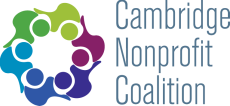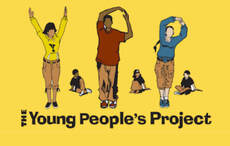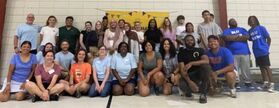|
What are the guiding principles and values of The Young Peoples Project?
YPP uses Math Literacy Work to develop the abilities of elementary through high school students to succeed in school and in life, and in doing so involves them in efforts to eliminate institutional obstacles to their success. YPP envisions a day when every young person — regardless of ethnicity, gender, or class — has access to a high quality education and the skills, attributes, and community support s/he needs to successfully meet the challenges of their generation. What are the ongoing services or programs that you provide? The core elements of YPP programming create individual and collective purpose and agency; and develop a sense of freedom about ‘work’. Through a cycle of learning, practice, teaching, and reflecting, YPP Math Literacy Workers learn math concepts they teach others, and develop social and professional competencies to collaboratively facilitate the learning experience for younger students in a cascading near-peer model. Over time students age and opt into leadership roles from MLWs to college MLWs (CMLWs) to program coordinators or directors. MLWs understand that their job is to help younger school-aged children value learning math. As MLWs see how their efforts fuel younger students and develop relationships, their self-confidence increases. They begin to develop an identity as an agent of change in the community, imbuing their work with a strong sense of purpose and meaning. As MLWs' confidence increase they take more ownership to address challenges in their work and develop strategies and solutions to overcome these challenges. As a result, their sense of responsibility, and their sense of freedom in the work expands. YPP embeds programming in local landscapes and contexts, through school, community, and university partnerships, and develops customized program models that share the same foundation. Are there any upcoming projects, initiatives, or events that your organization would like others to know about? We are very excited to start the year off strong with partnerships with Cambridge Public School District! Flagway teams are being established this year right now! Interested schools should send an inquiry email to [email protected] if they want to become a new partner! Please share a recent story/event that embodies the work of your organization. YPP hosted its annual Math & Computational Thinking Labs in Cambridge at the MIT Campus. This year’s institute centered on a series of 10 labs, which provided 75 high school and college Math Literacy Workers (C/MLWs) the opportunity to deepen their learning and dedication to their knowledge and instruction of math and coding content. Community Outreach Lab MLWs facilitate and teach younger students math games throughout different sites in Cambridge. The MLWs design workshops consisting of icebreakers, math literacy activities, a debrief and exit tickets. This summer’s workshops took place at the Putnam Ave Upper School and Cambridge Community Center each day for 75 middle grade student participants. Flagway Lab The High school Math Literacy Workers (MLWs) led by the College Math Literacy Workers (CMLW) completed a series of training of the Flagway Module. Each day of the training consisted of various exploration activities with content that ranged from even numbers, odd numbers, prime factorization, categorization, and cracking the möbius function. While the MLWs engaged in these different concepts of math, they played competitive games to show their learning progression. In the end, the MLWs were able to compete in a Flagway Tournament against their peers for a very fun and energetic yet educational experience! Mental Health Lab The objective for this lab was to introduce students to the concept of mental health, reduce stigma, and increase awareness about different aspects of mental well-being. YPP sought to set a foundation for high schoolers to be comfortable with their thoughts and feelings. Additionally, we wanted to equip students with practical stress management techniques to enhance their mental well-being. The goal was to help aid students to develop resilience skills and enhance their emotional well-being to better cope with challenges and adversity. Music Math Lab The Music Math Lab aimed to implement math with music in a way to challenge MLWs’ perspective on the use of mathematics, by finding creative ways to incorporate math into their own music compositions. This lab was conducted over a series of a few weeks where students would learn basic music theory, where the mathematics of it was highlighted. They were also taught a short tutorial on how to use the music production software, Garageband. After the short mini interactive music theory lesson, MLWs were granted creative freedom over their own song with one major criteria – the overarching theme of their lyrics has to be about math. Through this, MLWs are able to look beyond the technicality of math, to see the many ways in which math can be unknowingly incorporated in everyday life. Engineering Design Lab The Engineering Design Lab challenged the MLWs and encouraged them to hone in on their problem solving and team working skills. The lab culminated in an “Egg Drop” Challenge. The MLWs were put into groups and given a scarce list of materials to create a protective outer layer for their group’s egg. The egg would be dropped from a high place with the objective being to protect the egg from this drop. Many eggs were dropped, but only a few made it out of their protective layer still intact! Training of Teachers (ToT) Lab ToT stands for Training of Teachers and the goal of the module was to educate MLWs explicitly about general practices for making a welcoming space for the middle schoolers to learn. There were 4 separate lessons in the ToT lab. The first lesson focused on identity and how we may be similar or different from one another. The MLWs work with a diverse group of students and the MLWs themselves are a diverse group when it comes to all forms of social identity such as race, gender, ethnicity, religion etc. In this lesson they focused on noticing and celebrating those differences, understanding where one another may come from before coming into an educational space. One lesson led students to talk about their identities, think and reflect on them and aimed to teach them to be as kind and respectful towards the younger students they work with. Math Escape Room The Math Escape room was a spin on the typical escape rooms one might experience at a mall, where groups work together to solve problems to get out of the room they are in. The MLWS worked in groups to complete their rooms. Each room had at least 10-15 steps to it all math related. For example, one group had a question that asked participants to factor the number 30 using a factor tree to find the prime factors. If needed, the college MLWs would help the high school MLWs by sharing strategic hints to stimulate thinking and get participants unstuck. 3D Modeling Lab The 3D-Modeling Lab was an introduction to both 3D-modeling and using critical thinking to solve problems in a more pragmatic fashion. Over four workshops the MLWs used a browser based software, TinkerCAD, to solidify the basics of 3D-modeling. During each week, the MLWs were first treated to a lesson, to help them identify the theme of the week. Then, they were given a project to complete during the remaining time, because practice makes perfect. The projects were all partnered projects and had no creative restraints outside of being able to explain the concept. The lab culminated in a final problem solving activity provided by the lead YPP instructor utilizing computer-aided design in the CAD software environment. Math & Spades Lab Each summer, YPP invites at least one practicing mathematician to the Math and Computational Thinking Labs to focus on an area of mathematics of their choosing. This summer, with the support of the American Mathematical Society, we worked with Dr. Gregory Benoit (pictured at board), lecturer of mathematics at Boston University, to uncover the mathematics of the card game “Spades”. The mathematics of focus in this 6 week lab centered on combinatorics, probability and game theory. Combinatorics is a rigorous discipline that does not have easy and ready-made algorithms. Despite its challenges, combinatorics is a fascinating and rewarding field of study, especially when used in conjunction with card games such as Spades. The study of combinatorics, probability, and game theory has applications in many areas of mathematics, engineering, and even computer science. For decades, Poker has been decomposed and discussed for its mathematical relevance in dominant communities. This summer, we spent time together to begin a rich mathematical investigation of Spades, a member of the Whist family of card games, which has been played for generations by Black college students, soldiers and young adults. It is our hope that one day soon, we will write an academic article and present our findings. In addition to Dr. Benoit, Dr. Greg Budzban, professor and president emeritus from Southern Illinois University-Edwardsville led a 3-day workshop focused on matrices for the Lab participants. Math & Yoga Lab with Ashley Houston-King This summer BU doctoral student Ashley Houston-King with the support of the Lululemon Ambassador fellowship, led a lab which examined the connections between yoga and mathematics. “When I think about the relationship between yoga and math, I hope that the young people become aware that asana, also known as the yoga poses, each have their own specific alignment, energetic directions and angles that require students to use the strength and energy in their bodies to find balance within their minds, bodies and souls.” - Ashley YPP Students travel to North Carolina for a workshop with MathKind! Additionally, this summer a group of the YPP Computational Thinking Lab MLWs and CMLWs traveled to North Carolina to participate in a Community Math Day. While there the students organized Flagway activities for 3-8th graders, both tabletop and floor, to represent how it can be used to teach math concepts such as prime numbers, factorization, categorization and the Möbius function! Comments are closed.
|
|
Contact Us
Cambridge Nonprofit Coalition
C/O Mission Earth
1257 Worcester Road, #312
Framingham, MA 01701
Elena Sokolow-Kaufman
Executive Director
[email protected], 617-401-7948
Cambridge Nonprofit Coalition
C/O Mission Earth
1257 Worcester Road, #312
Framingham, MA 01701
Elena Sokolow-Kaufman
Executive Director
[email protected], 617-401-7948



 RSS Feed
RSS Feed